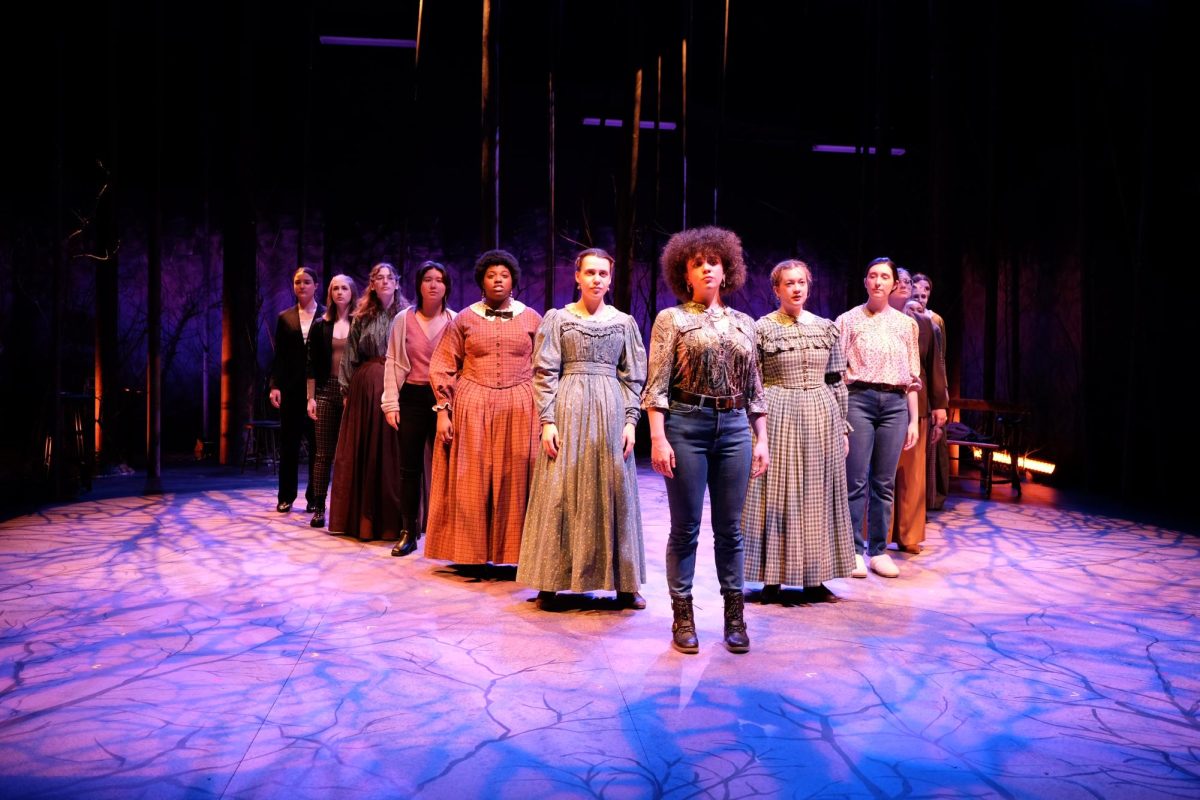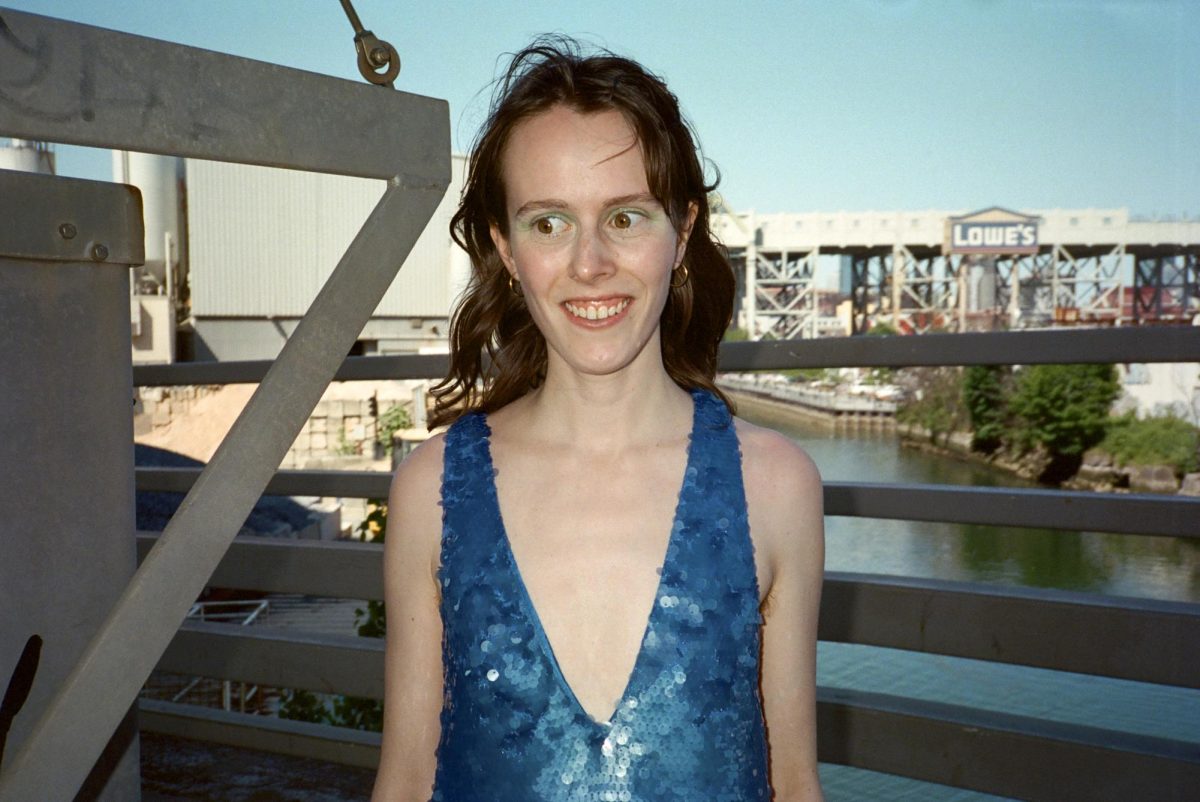I looked out onto the stage, excitedly chatting with my friend as I took in the first scene of Ancestra, directed by Assistant Professor of Theater Anjanette Hall. The set was intricate and beautiful, with shadows of branches in the stage lights and artificial trees that surrounded the center stage. I nudged my friend eagerly, waiting for the show to begin. As the actors emerged, their choreography mesmerized me, beckoning me to immerse myself in a narrative of women’s liberation. However, despite my best attempts, I couldn’t see myself in the sisters on the stage.
Ancestra covers two different narratives within its two-hour runtime. The first is about Cora, played by College first-year Ela Carola Shapiro-Alster. Cora is a strong-willed journalist who wants to write about abortion rights after the overturning of Roe v. Wade as she struggles with censorship and a pregnancy of her own. This story is interspersed with the story of women in Oberlin’s women’s college in the 1800s, who retreat to the woods in order to engage with intellectual and political pursuits in a way that goes beyond the then-perceived scope of women’s roles. The two narratives have very different major conflicts, the first being about abortion and the second being about women’s suffrage, but both are linked under the banner of feminism.
As a feminist from Texas that currently attends Oberlin, my feelings were complex.
Although Ancestra attempts to explore the themes of women’s struggle for rights under the patriarchy, I found the play to be a shallow ode to white feminism that refuses to fully explore the many themes it touches on. The play attempts to bring up race relations, poverty, abuse, censorship, and internalized misogyny, but the way it approaches these themes is cursory. Despite these complex themes, the narrative itself reads less like an intellectual discussion of the rights of women and more like a prime example of white feminism that focuses on the abandoning of nuance and intersectionality for the pursuit of sisterhood among women.
The script has a consistent problem with flattening its issues, even the primary ones, into their base forms. The issue of abortion rights is explored only through the experience of a woman who lives in a state where she can get an abortion. The most hostile experience Cora has in relation to abortion is one that she manufactures by going undercover to a crisis pregnancy center as a patient. By the end of the play, she is able to go to a Planned Parenthood facility and get the abortion she needs, which is explained to the audience through a monologue. The story of the Oberlin suffragettes culminates with all the women who once sought intellectual and political freedom in the woods attending a rally for women’s suffrage. They give monologues about the rights of women alongside the two Black characters, which starkly contrasts with the historic racism found in early suffragette movements. The issue of racialized oppression of women is boiled down to the throwaway line of “we are nobody’s property” and never expounded upon. Despite the necessity of Black characters within the play, they feel like an afterthought. The script refuses to outright say the words “slavery” or “Black” or even “race,” eliminating any nuance that impedes Black women’s struggle for freedom.
I began to realize that this play was not written for me. The sisters that called out “I’m here,” “I’m with you,” were never speaking to me, a Black woman from Texas. Unlike Cora, if I fell pregnant, I would not be able to easily seek an abortion within my state, and I could still be punished if I sought one elsewhere. I know that if I cried to these women about what I’ve experienced — the violence, the fear, the hostile stares I’ve often endured — they would tell me to buck up and join arms with them in a circle in the woods. While this may feel okay for a time, it does nothing to solve my issues. I’m still racialized and devoid of bodily autonomy. As much as I wish that a fun frolic through the woods would solve my problems, I am painfully aware that blind sisterhood involves my erasure.
Erasure is a common theme within the script, obfuscating a story that feels disjointed and aimless, one that has the thesis statements of sisterhood and abortion’s moral neutrality, a story that erases me and my ancestors from our own narrative. The sisters that call to me are not the ones on the stage, overwhelmingly white femmes gallivanting around in gorgeous dresses under bright lights in a staged woodland. My sisters call to me from the fields of Georgia and Arkansas as they work under sticky summer heat. I feel their sweat on my brow when I write about myself, my own oppression and struggle. I felt that sweat as the play came to a close, knowing that it was yet another white woman allowed to express justified anger in a way that I, a Black woman, could never. As a creative person, I sigh, and as a human, I weep.
Despite my problems with the script, I applaud the cast and crew for their efforts. For all the defects in content, there were absolutely no defects in execution. I found the performance itself to be mesmerizing, and everything from the choreography to the energy the actors put into their performances immersed me into the narrative. Everything from the lights to the costuming immersed me into the world of the play, and the split between the narrative of the suffragettes and Cora’s story is easy to understand. The music enhances the experience, wrapping me into the world of the play. Overall, I think the production was a technical success.












